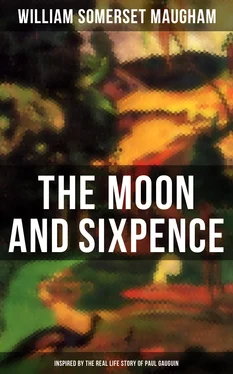Now the war has come, bringing with it a new attitude. Youth has turned to gods we of an earlier day knew not, and it is possible to see already the direction in which those who come after us will move. The younger generation, conscious of strength and tumultuous, have done with knocking at the door; they have burst in and seated themselves in our seats. The air is noisy with their shouts. Of their elders some, by imitating the antics of youth, strive to persuade themselves that their day is not yet over; they shout with the lustiest, but the war cry sounds hollow in their mouth; they are like poor wantons attempting with pencil, paint and powder, with shrill gaiety, to recover the illusion of their spring. The wiser go their way with a decent grace. In their chastened smile is an indulgent mockery. They remember that they too trod down a sated generation, with just such clamor and with just such scorn, and they foresee that these brave torch-bearers will presently yield their place also. There is no last word. The new evangel was old when Nineveh reared her greatness to the sky. These gallant words which seem so novel to those that speak them were said in accents scarcely changed a hundred times before. The pendulum swings backwards and forwards. The circle is ever travelled anew.
Sometimes a man survives a considerable time from an era in which he had his place into one which is strange to him, and then the curious are offered one of the most singular spectacles in the human comedy. Who now, for example, thinks of George Crabbe? He was a famous poet in his day, and the world recognised his genius with a unanimity which the greater complexity of modern life has rendered infrequent. He had learnt his craft at the school of Alexander Pope, and he wrote moral stories in rhymed couplets. Then came the French Revolution and the Napoleonic Wars, and the poets sang new songs. Mr. Crabbe continued to write moral stories in rhymed couplets. I think he must have read the verse of these young men who were making so great a stir in the world, and I fancy he found it poor stuff. Of course, much of it was. But the odes of Keats and of Wordsworth, a poem or two by Coleridge, a few more by Shelley, discovered vast realms of the spirit that none had explored before. Mr. Crabbe was as dead as mutton, but Mr. Crabbe continued to write moral stories in rhymed couplets. I have read desultorily the writings of the younger generation. It may be that among them a more fervid Keats, a more ethereal Shelley, has already published numbers the world will willingly remember. I cannot tell. I admire their polish—their youth is already so accomplished that it seems absurd to speak of promise—I marvel at the felicity of their style; but with all their copiousness (their vocabulary suggests that they fingered Roget's Thesaurus in their cradles) they say nothing to me: to my mind they know too much and feel too obviously; I cannot stomach the heartiness with which they slap me on the back or the emotion with which they hurl themselves on my bosom; their passion seems to me a little anaemic and their dreams a trifle dull. I do not like them. I am on the shelf. I will continue to write moral stories in rhymed couplets. But I should be thrice a fool if I did it for aught but my own entertainment.
Table of Contents
But all this is by the way.
I was very young when I wrote my first book. By a lucky chance it excited attention, and various persons sought my acquaintance.
It is not without melancholy that I wander among my recollections of the world of letters in London when first, bashful but eager, I was introduced to it. It is long since I frequented it, and if the novels that describe its present singularities are accurate much in it is now changed. The venue is different. Chelsea and Bloomsbury have taken the place of Hampstead, Notting Hill Gate, and High Street, Kensington. Then it was a distinction to be under forty, but now to be more than twenty-five is absurd. I think in those days we were a little shy of our emotions, and the fear of ridicule tempered the more obvious forms of pretentiousness. I do not believe that there was in that genteel Bohemia an intensive culture of chastity, but I do not remember so crude a promiscuity as seems to be practised in the present day. We did not think it hypocritical to draw over our vagaries the curtain of a decent silence. The spade was not invariably called a bloody shovel. Woman had not yet altogether come into her own.
I lived near Victoria Station, and I recall long excursions by bus to the hospitable houses of the literary. In my timidity I wandered up and down the street while I screwed up my courage to ring the bell; and then, sick with apprehension, was ushered into an airless room full of people. I was introduced to this celebrated person after that one, and the kind words they said about my book made me excessively uncomfortable. I felt they expected me to say clever things, and I never could think of any till after the party was over. I tried to conceal my embarrassment by handing round cups of tea and rather ill-cut bread-and-butter. I wanted no one to take notice of me, so that I could observe these famous creatures at my ease and listen to the clever things they said.
I have a recollection of large, unbending women with great noses and rapacious eyes, who wore their clothes as though they were armour; and of little, mouse-like spinsters, with soft voices and a shrewd glance. I never ceased to be fascinated by their persistence in eating buttered toast with their gloves on, and I observed with admiration the unconcern with which they wiped their fingers on their chair when they thought no one was looking. It must have been bad for the furniture, but I suppose the hostess took her revenge on the furniture of her friends when, in turn, she visited them. Some of them were dressed fashionably, and they said they couldn't for the life of them see why you should be dowdy just because you had written a novel; if you had a neat figure you might as well make the most of it, and a smart shoe on a small foot had never prevented an editor from taking your "stuff." But others thought this frivolous, and they wore "art fabrics" and barbaric jewelry. The men were seldom eccentric in appearance. They tried to look as little like authors as possible. They wished to be taken for men of the world, and could have passed anywhere for the managing clerks of a city firm. They always seemed a little tired. I had never known writers before, and I found them very strange, but I do not think they ever seemed to me quite real.
I remember that I thought their conversation brilliant, and I used to listen with astonishment to the stinging humour with which they would tear a brother-author to pieces the moment that his back was turned. The artist has this advantage over the rest of the world, that his friends offer not only their appearance and their character to his satire, but also their work. I despaired of ever expressing myself with such aptness or with such fluency. In those days conversation was still cultivated as an art; a neat repartee was more highly valued than the crackling of thorns under a pot; and the epigram, not yet a mechanical appliance by which the dull may achieve a semblance of wit, gave sprightliness to the small talk of the urbane. It is sad that I can remember nothing of all this scintillation. But I think the conversation never settled down so comfortably as when it turned to the details of the trade which was the other side of the art we practised. When we had done discussing the merits of the latest book, it was natural to wonder how many copies had been sold, what advance the author had received, and how much he was likely to make out of it. Then we would speak of this publisher and of that, comparing the generosity of one with the meanness of another; we would argue whether it was better to go to one who gave handsome royalties or to another who "pushed" a book for all it was worth. Some advertised badly and some well. Some were modern and some were old-fashioned. Then we would talk of agents and the offers they had obtained for us; of editors and the sort of contributions they welcomed, how much they paid a thousand, and whether they paid promptly or otherwise. To me it was all very romantic. It gave me an intimate sense of being a member of some mystic brotherhood.
Читать дальше









![John Bruce - The Lettsomian Lectures on Diseases and Disorders of the Heart and Arteries in Middle and Advanced Life [1900-1901]](/books/749387/john-bruce-the-lettsomian-lectures-on-diseases-and-disorders-of-the-heart-and-arteries-in-middle-and-advanced-life-1900-1901-thumb.webp)

